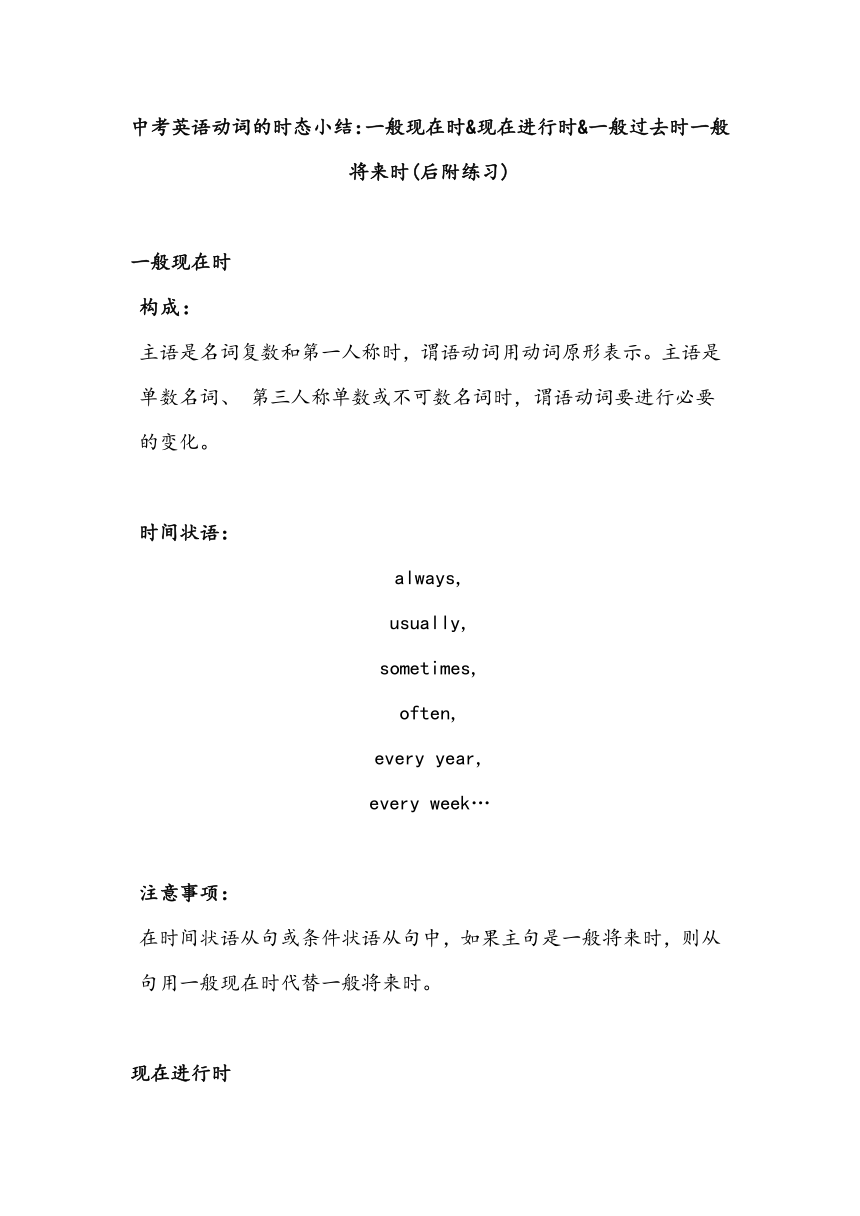
中考英语动词的时态小结:一般现在时&现在进行时&一般过去时一般将来时(后附练习) 一般现在时 构成: 主语是名词复数和第一人称时,谓语动词用动词原形表示。主语是单数名词、 第三人称单数或不可数名词时,谓语动词要进行必要的变化。 时间状语: always, usually, sometimes, often, every year, every week… 注意事项: 在时间状语从句或条件状语从句中,如果主句是一般将来时,则从句用一般现在时代替一般将来时。 现在进行时 构成: be(am/is/are)+动词ing形式 时间状语: now, right now, at the moment, look, listen, at present, this week, these days… 注意事项: 用arrive, come, go, leave等动词的现在进行时描写行程安排,有“将到达”和“将离去”的意思。 一般过去时 构成: ①一般情况在词尾直接加-ed; ②以e结尾的动词加-d; ③以重读闭音节结尾的动词,如末尾只有一个辅音字母,则双写该辅音字母,再加-ed; ④ 以辅音字母加 y结尾的动词变y为i,再加-ed。 时间状语: yesterday, two days ago, just now, last week/month/year, the other day, once upon a time, in the old days… 注意事项: 有些句子,虽然没有表示过去确定时间的状语,但实际上是指过去发生的动作或状态,要联系语境来判断。如: I didn’t know you were in hospital. 一般将来时 构成: will+动词原形 be going to+动词原形 时间状语: tomorrow, next week/month/ year, in the future… 注意事项: 在表示将来发生的事情时,二者的区别主要是:be going to 用于主观判断,即说话人主观上计划或安排将要去做的事情。表示近期、眼下就要发生的事情。will则多用于客观的情况,表示的将来时间则较远一些。 # 动词时态专练 # Ⅰ. 单项选择。 ( )1. Mrs. Smith usually _____ the newspaper after breakfast. A. read B. reads C. will read D. is reading ( )2. Look! An elephant _____ this way. A. came B. comes C. will come D. is coming ( )3. I _____ what the old woman _____ is right. A. think; said B. thought; say C. am thinking; say D. will think; said ( )4. — Slow down! Someone _____ the road. — OK. A. crosses B. crossed C. is crossing D. would cross ( )5. — Please say your phone number again. I _____ catch it. — 290-7168. A. don’t B. didn’t C. won’t D. wouldn’t ( )6. There _____ a lion show in the zoo tomorrow morning. A. has B. will have C. is going to have D. is going to be ( )7. Come home early, or your parents _____ about you. A. will worry B. to worry C. worried D. worry ( )8. Grandma is making soup in the kitchen. How nice it _____! A. smelt B. smells C. will smell D. is smelling ( )9. — What’s Alex doing right now — He _____ soccer. He _____ soccer every Saturday on the playground. A. plays; playing B. plays; will play C. is playing; plays D. is playing; played ( )10. Please remember to turn off the lights when you _____. A. left B. leave C. will leave D. is leaving Ⅱ. 用括号内所给动词的适当形式填空。 1. The story _____ (happen) on a rainy morning. 2. People _____ (travel) by the flying car in 100 years. 3. The earth _____ (move) around the sun. 4. It’s nine o’clock. Dale _____ (work) in the office now. 5. — Who sings best in your class — Alice _____ (do). 6. I often _____ (swim) in the river when I _____ (be) a child. 7. If Bob _____ (stay) away ... ...
~~ 您好,已阅读到文档的结尾了 ~~

